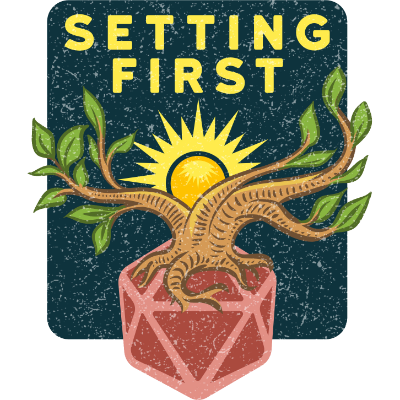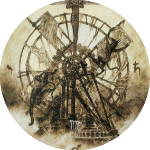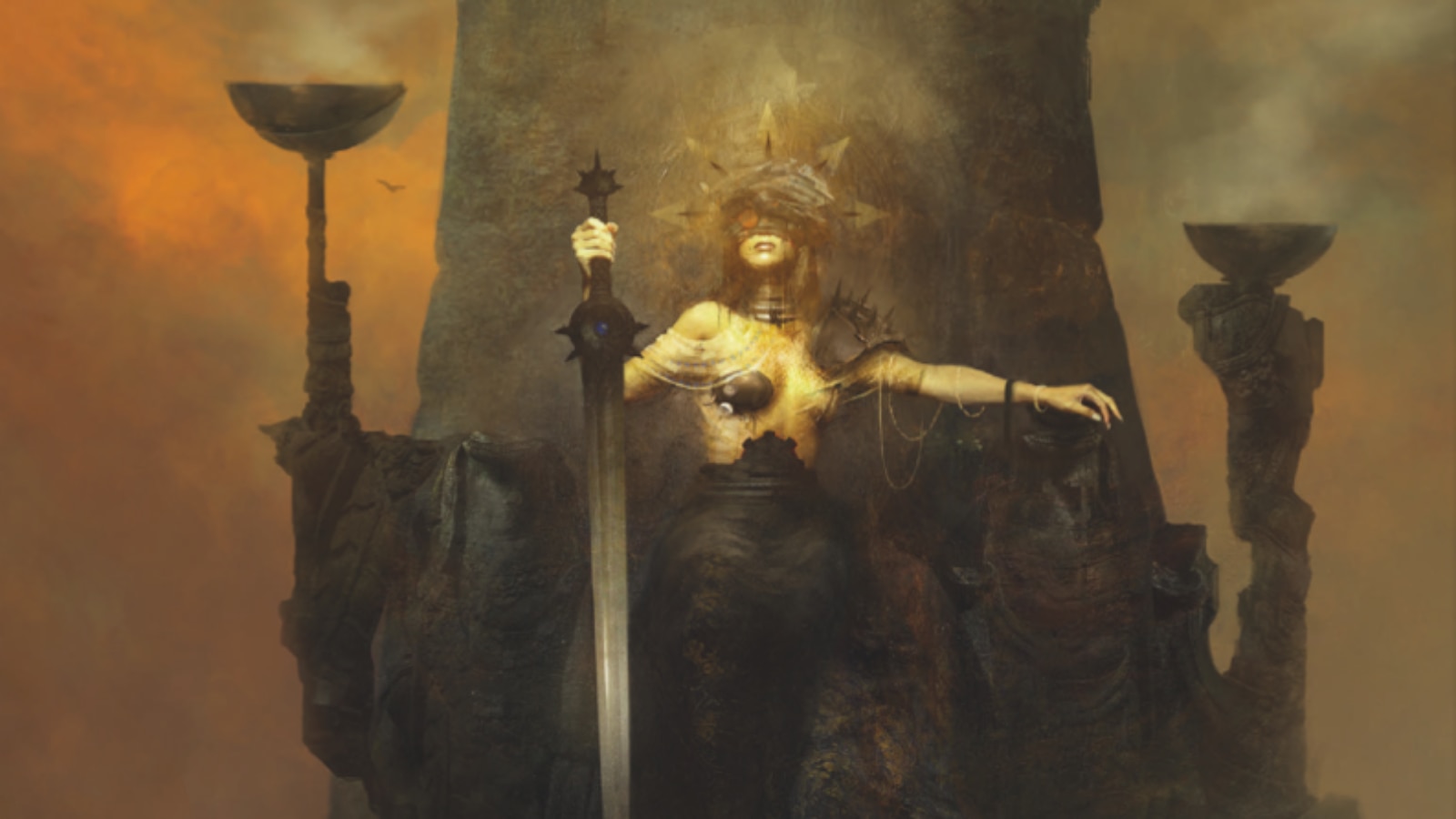
Arkhane Asylum’s GODS follows a path less taken.
This text appeared originally as a three-part read-through review on the Unpossible Journeys Discord server. It has been slightly edited for clarity.
A Look Into GODS
GODS is published by Arkhane Asylum, a French publisher that mostly does translations of games from Free League, Modiphius and the World of Darkness games. According to a French player in my Degenesis group, they are quite well known in the local scene and seem to do good work overall but there is not much of a track record for in-house work yet.
The two main creators of GODS are Bastien Lecouffe Deharme (whom I know as the artist of the excellent Kult: Divinity Lost covers, but apparently he’s more famous for other works in the comic/graphic novel scene) and Julien Blondel (who, according to Arkhane Asylum’s website, has worked in game design and translations for over 20 years). All in all a good 30 people are credited in the core rulebook, which makes this look like a “serious” project of an experienced publisher and not just the funny kickstarter foray of an artist who was a bit bored.
My preliminary sentiment – just from reading, without having played it – is: GODS is definitely worth a closer look for a number of reasons and should be a good addition to a gamer’s library, but not everything will click and work for everyone right off the bat. There is a lingering sense of not-quite-fulfilled potential here, and the game seems to fall into the “acquired taste” category so I can’t see the usual RPG crowd switching to this game in droves.
Arkhane Asylum brands this game as Dark Fantasy, because these days everything needs to be Dark Fantasy somehow, apparently. I’ll take the liberty and make the bold statement that this is a bit of a wrong categorization. Granted, there is some magic here and some beasts to fight, and the game world is about as thoroughly hell-bent as the one of Degenesis or Symbaroum. However, there are no Orcs here, no Elves, no Dwarves, no flying birdpeople, no talking ochre jellys. It’s all humans and some beasts that are more “large animal” than anything else. The central themes of this game seem to be religion and mythology rather than fantasy, and the setting gives some A Song of Ice and Fire vibes off to me, among others. I do see some parallels to Degenesis as well in the way how the setting shapes the game.
My command of the French language isn’t anywhere near sufficient to read this in the original version, so I picked up the English translation. It’s not perfect, there are a few weird choices for words and some typos left, but overall it doesn’t impact the reading experience too much or distort the sense.
GODS touches upon a number of themes that probably wouldn’t pass the current WOTC sensitivity reading. Slavery is rampant in the setting, not every culture in the game values women the same as men, there are quite a few descriptions (but, at least in the core rulebook, not depictions) of explicitly brutal acts and full frontal nudity is a thing here. Discretion is advised and this is definitely not a PG-13 book. However, in my opinion these themes never leave the realm of plausibility and aren’t simply there as gratuitious edgelordiness, but serve the goal of painting a world that is both troubled and desperate. I chose the Diablo game soundtracks as accompanying music for my reading and thought they were fitting this setting very well.
The gist of the setting and central hook of the game is as follows: In ancient times, the humans first venerated the Gods but eventually committed a transgression that caused the Gods to leave the world. This coincides with a solar eclipse and results in a near-apocalyptic phase. Amidst this chaos, there is an oracle that declares the Gods will return once a thousand years have passed, which gives humanity new hope. However, before the time is up, a doomsday cult praying to a single god (The Black Sun) emerges and begins to rise in power and influence throughout the world. Now, as the time nears where the old Gods are supposed to return, powerful artifacts called shards are discovered by selected mortals (called The Chosen) who are supposed to prepare the gods’ return and do their bidding. Among these Chosen are the player characters, and the Black Sun cult serves as the main antagonist in the game.
The exact interpretation of what led to the Gods’ exile and what exactly happened during the night of the Black Sun differs from culture to culture in the game. Some believe the Gods are actually dead and will never return, others believe they have never left etc.
The Wildlands
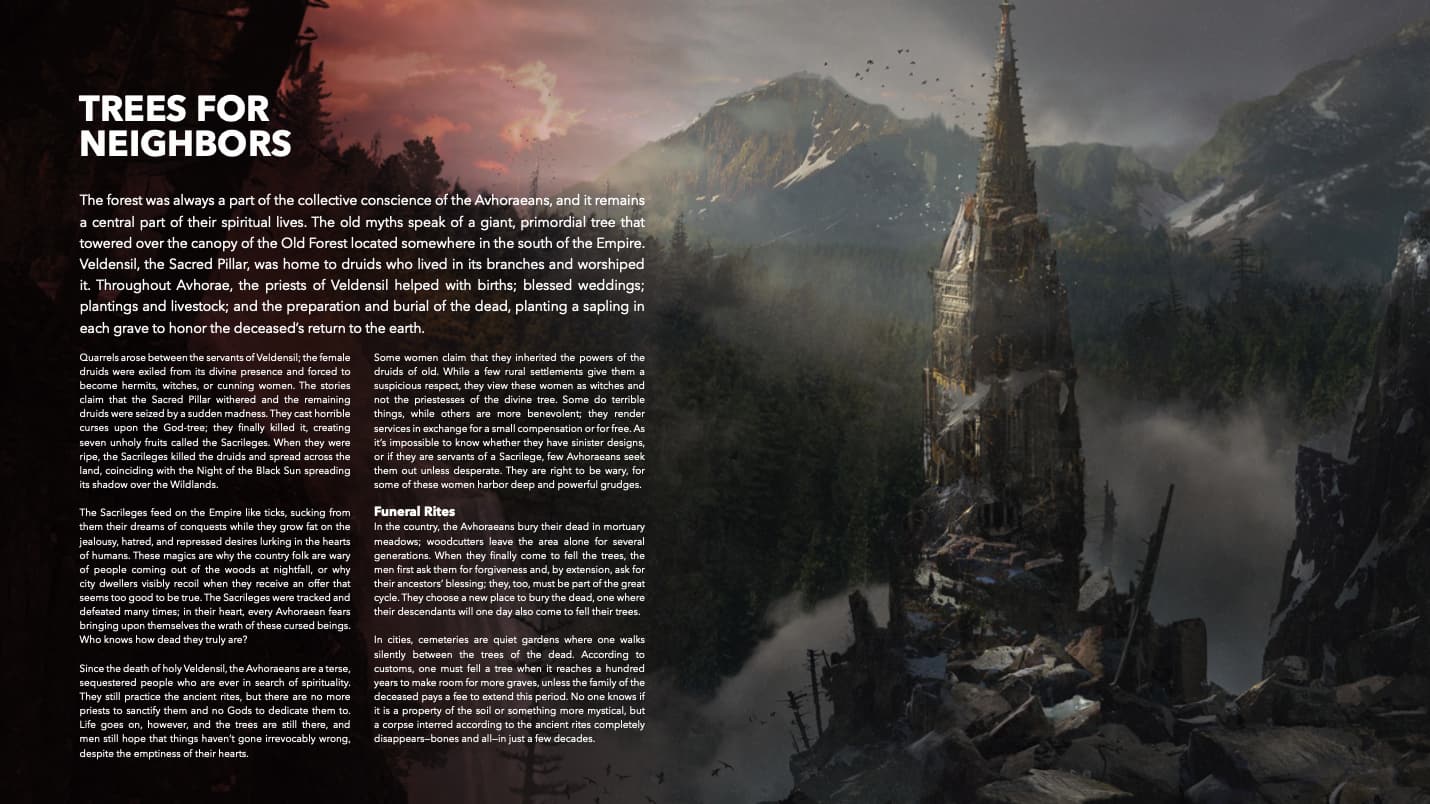
All of this serves as a strong foundation to build an interesting setting and GODS mostly succeeds in that, but I have a few nitpicks as you can read below. Thirteen cultures exist in the setting, which is called the Wildlands. Most have clearly been inspired by real-world cultures (nothing wrong with that) but not every one has been blessed with the same level of creativity in my opinion. If anything, they serve to portray a very heterogenous game world. The book spends about ten pages on each, and here they are:
Babel – Navel of the world and most prestigious nation, whose Queen has recently converted to the Black Sun Cult. Pretty Babylonian.
Khalistan – Two neighbouring countries consisting of mostly desert and caravans. Pretty Arabian.
Ool – Nine independent city-states ruled by masked sorcerer-kings. Pretty creative, some Voodoo vibes.
Saeth – A country next to a volcano where the ruling caste feeds on the lifeforce of their servants to prolong their existence while everyone is waiting for the inevitable catastrophic volcano eruption. A land of utter despair, where your suicide somehow increases the stature of your kin. Definitely a great place! But pretty creative in its grimdarkness, I’d say.
Tuuhle – A jungle with dark-skinned people and animal-spirits. Pretty Mock-Fantasy-Africa and in all honesty a bit bland to read in comparison.
The Empire of the Black Sun – Formerly the Empire of Lux. This is where the Cult took root and therefore, this is “The Baddies”. Faux-Rome to the point of ridicule (the former emperor was assassinated by Marcus Brutus, and the current emperor is unironically named Nero Crassus Primus. Boy…)
The Horde – Very Mongolian, but at least some interesting ideas in between.
Tegee and the Republic of Thalos – Faux Ancient Greece that thinks it is much more progressive than it actually is.
Aon – Almost feels like a carbon copy of the Iron Islands from Game of Thrones, but there are worse places to steal your worldbuilding idea from.
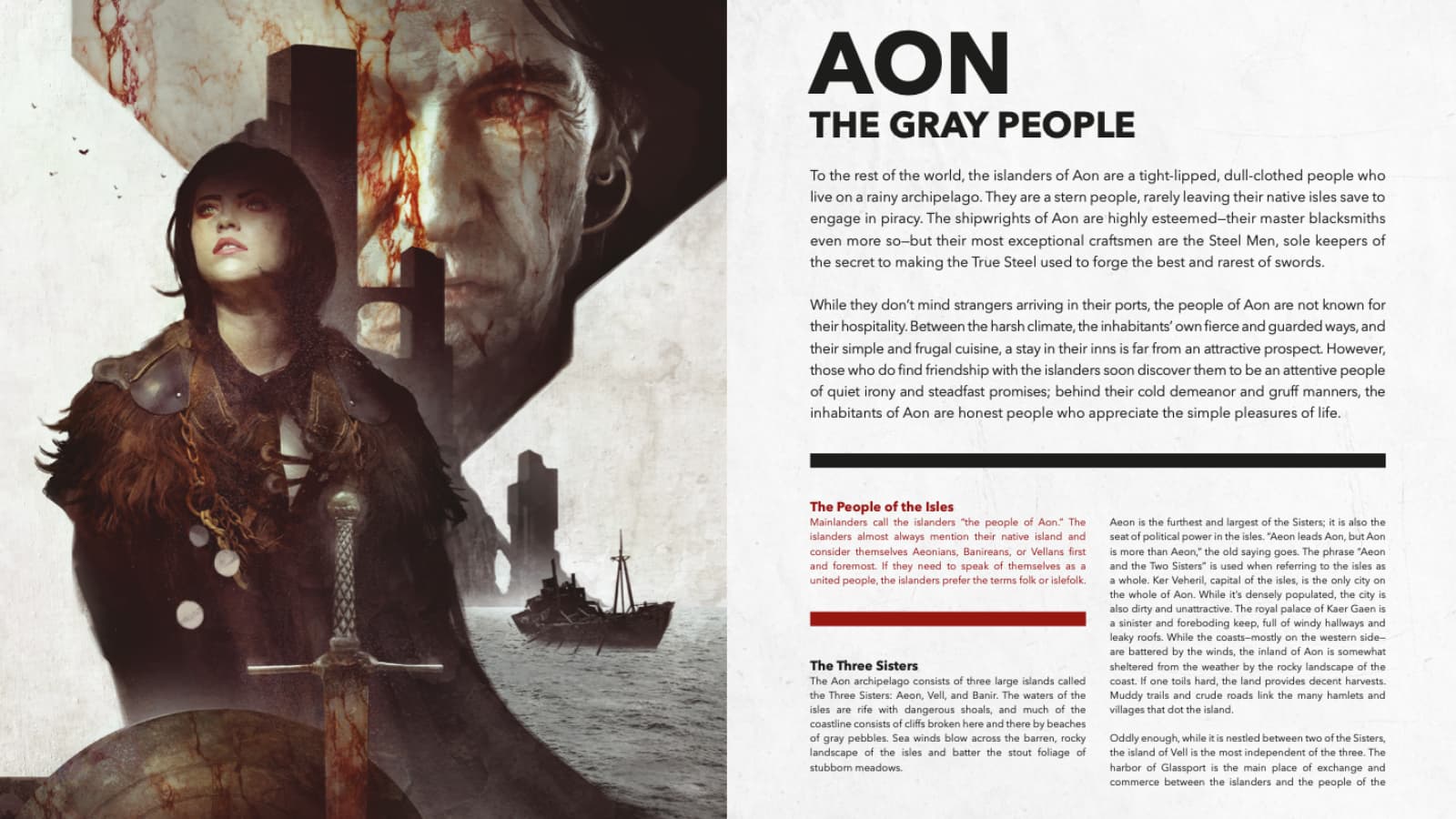
Avhorae – More or less the knightly good guys opposing the Black Sun Empire. Pretty standard faux-medieval kingdom but some good ideas between the lines as well.
Divided Kingdoms – Thirteen little “kingdoms” squabbling with each other, each the size of a middling county. They are the result of a former kingdom falling apart as the last king thought it’d be a splendid idea to drink himself senseless instead of, like, rule. He did have a hard time before that and there may or may not have been a curse in play so one could feel some sympathy, but his underlings clearly thought otherwise and got rid of him in bloody fashion.
Vaelor – Viking Raiders called Vaelkyr, brutal and heavy into slavery and sexual exploitation of their victims since they turn more and more sterile and are panicking about their sacred bloodlines.
Valdheim – An offshoot of the Vaelkyr that rejected their sinister Gods and brutal ways, so this is the friendly Viking faction basically.
To me this feels a bit hit-and-miss. There are a lot of hints here at small secrets supposed to be revealed by the GM to the players, but I don’t get the idea of an overarching, highly-detailed metaplot or a grand design here.
A strong selling point for GODS however is – unsurprisingly - the art.
The Mechanics
At it’s heart, GODS features a D10-based Dice Pool system that is fairly straightforward at first glance but soon turns into a quite complex endeavour. The system is called TOTEM and is used for at least one other French Game as well: Vermine 2047, a smaller-scale postapocalyptic game from Studio Agate (Shadows of Esteren/Fateforge), which was released in 2022.
It starts with four Categories (Body, Hand, Mind, Soul) split up into two Traits each (Strength & Resistance, Accuracy & Reflexes, Knowledge & Perception, Willpower & Empathy). Each of those traits supply a pool ranging from one to three dice that are used for skill checks. Later in the game, as The Chosen become more powerful than ordinary humans, these trait dice can be raised up to five.
Next, there is a list of 30 Skills broken down into the categories of The Human, The Tool, The Weapon, The Animal, The Wildlands, and The Unknown. Unlike games with similar systems, using these skills is not directly or implicitly tied to a trait in the rules. It is up to the player and GM to figure out the correct combination for each skill check, though many times this will be pretty straightforward (the combination of Knowledge & Pantheons makes sense, the combination of Resistance & Pantheons probably does not). The exception to this is combat, where the weapon used defines the associated trait.
These individual skills can be developed at character creation (and later through rolling XP dice) into increasing competency levels that supply more dice and grant rerolls (up to three each) in alternating fashion. The XP dice are granted for completing milestones in the scenarios based on “Three D” – Dangers bested, Discoveries made and Duration spent in the adventure.
During a skill check, the GM will announce a difficulty (ranging from 3 for “absolutely banal task” to 10 for “legendary feat”), and the player will pick up their dice from the trait and skill pools. If at least one die shows the target number of the check or exceeds it, it’s a success. More successes translate into either quantitative or qualitative alteration of the result (three successes on a skill check to find food in the forest may yield three days worth of rations, for example). Some circumstances may lead the GM to impose an alteration of the dice pool due to either complications or beneficial circumstances.
So far, so simple, but GODS doesn’t stop here.
There are more sources for the player to influence the skill check: An individual character’s Nerves and Grit pools may add dice or rerolls, the shared Party pool can do both, and as soon as the Player character becomes a Chosen (the default state of the game, though one may deviate from this and let the characters earn their Shards first) there are additional Humanity and Divinity Pools that can supply dice as well. There is, however, a limit in how many pool dice can be added to the check, regardless where they are coming from (maximum is equal to the trait used). At higher competency levels in a skill, the character may also earn specializations that give more dice for a specific application of the skill (such as “Axes’ for the Melee skill).
On the other hand, wounds and exhaustion (from depleting the Nerves and Grit pools) remove dice from the skill check.
In my opinion rules are much more of a matter of personal taste than a matter of observable quality, so I will refrain from too much of a premature commentary on this. I would have to try and see in practice how well all of this works, but it does feel a bit Numeneran to me and looks a bit over-engineered. As the pools seem to rather easily refill, we may be looking at something of a count-and-roll-fest as the GM tries to force the players to spend all their pools. Then again, I don’t see anything here that looks obviously imbalanced or broken.
One more word on the Party Pool, which also serves as somewhat of a “morale” counter for the group. GODS is big in rewarding cooperation between the players. Collective actions that succeeded, a good shared meal, or the execution of a Tenet (more on that further down) refill the Party Pool. Disagreements in the group or collectively experienced hardships (like: group is out of food, or worse, a group member or friendly NPC has been killed) deplete the Pool. Using the Party Pool Dice for one’s individual actions requires the consent of the group, which can support the cooperation and dialog at the table. This idea isn’t new to GODS (Age of Sigmar: Soulbound has a similar shared resource, for example) but I can see the appeal.
Combat is a relatively straightforward affair. Initiative is rolled (with all baddies going on the same initiative), then skill checks are made to attack and parry/dodge. A character can move and do a single action per turn, they can defend more than once if they like but suffer stacking penalties to their rolls if they do so. More experienced fighters don’t get more attacks but may choose to lower their roll’s difficulty (which also eases the dodge/parry roll for their opponents, but can maximize damage) or vice versa increase the difficulty (making it harder for themselves to hit, but may render an inexperienced opponent incapable of defending successfully).
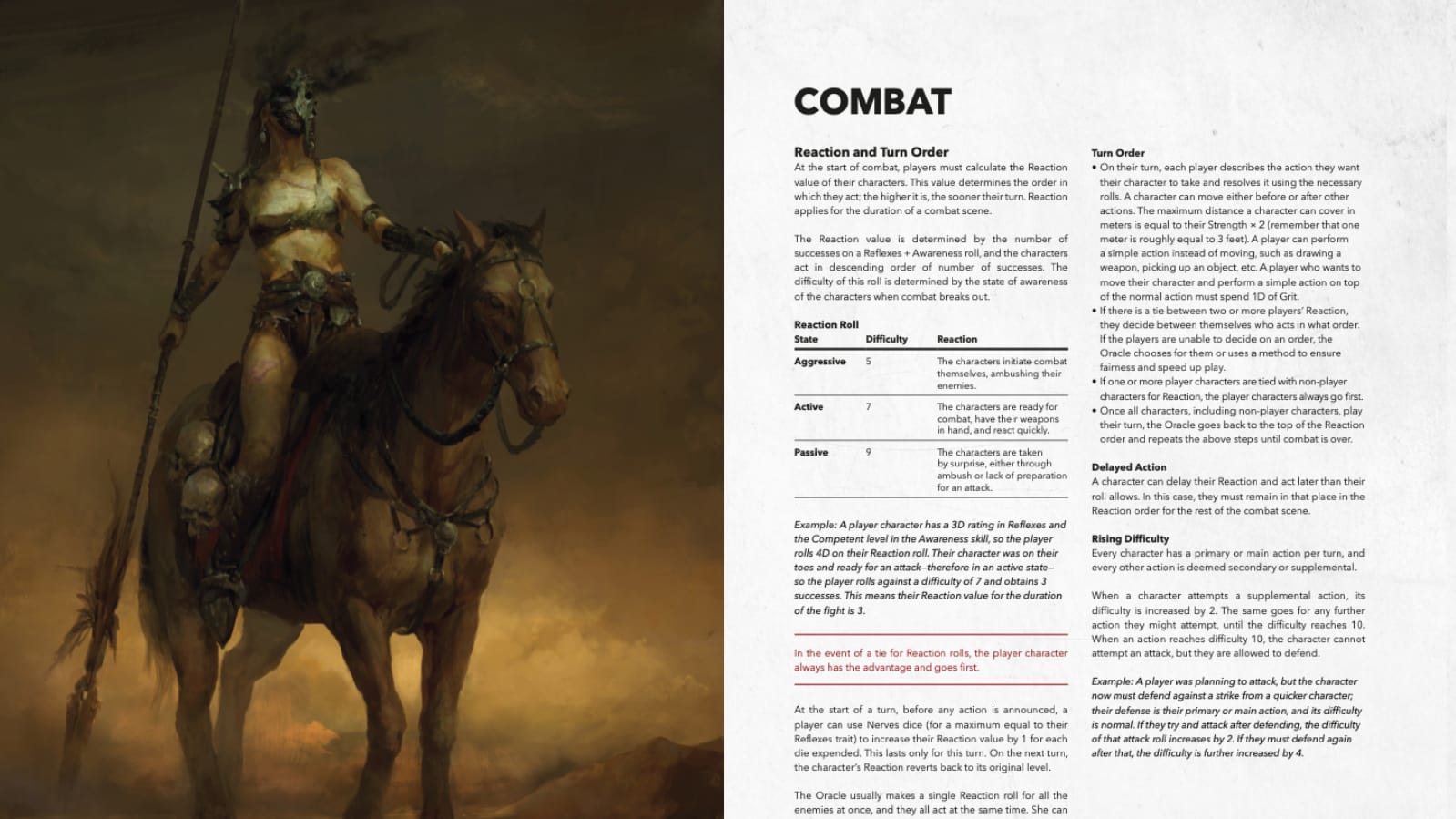
Armor reduces incoming damage, the magnitude depending on the armor and damage type which adds a little bit of “realism” here that’s far too rarely seen in fantasy games in my opinion. Leftover damage is checked whether it surpasses certain damage thresholds based on the hit character’s traits. If it does, a wound is inflicted. Heavier wounds (or stacking ones) may kill a character if not treated outright. Wounds also reduce the dice pools, so there is a bit of a death spiral here that should serve to keep The Chosen on their toes.
Rules like targeting (and losing) specific body parts, combat maneuver masteries or more punishing healing /health recovery rules are supplied as optional for groups that want to add this layer of detail and difficulty, which is a nice touch.
In contrast to the detailed character sheets, NPCs are a very simple affair. You meet a John Doe, they have three dice to roll for all opposed tests and be done with it. If the thing that’s attempted is somehow in their area of expertise or they are more experienced or dangerous, the GM adds dice at their discretion or as lined out in the very slim stat blocks for predefined beasts and opponents. Simulationists may scoff at this superficial treatment but I think it fits a player-centric game like GODS just well.
A word on magic, which does exist in the setting but clearly exceeds the understanding of most mortals, and also takes a shape quite differently from “I concentrate for six seconds and a fireball is hurled towards my enemies but only four times a day, because then I somehow forget how this works until tomorrow.” For the players, magical effects can be obtained in three ways:
- Through the Shard, i.e., the special item that binds them to their god of choice and comes with a magical property of sorts. Example: A shard with the Silence property can suppress all sounds in a small radius once per day;
- Through Favors (powerful passive abilities that are granted by the GODS to their Chosen, such as poison immunity);
- and through Rituals, which are temporary beneficial effects that The Chosen can gain through conducting a ritual. A simple ritual called Resistance protects the Chosen from any Grit Pool loss due to exhaustion from cold or heat, for example. These rituals often require some time and some form of item (usually destroyed in the process) or even a sacrifice to work, so they are not “combat spells”.
The Chosen only receive a limited number of these Shard abilities, favors or rituals at character creation, but more and more powerful ones can be obtained later with XP rolls (and progressing bind to their god). The book isn’t really exhaustive on the Rituals, only describing some examples for these and encouraging the GM and player to develop their own. For someone who has read 600+ individual spell descriptions for Splittermond this may feel a bit like a lazy cop-out, but I reckon it’s actually going to be quite okay for most.
Character Creation
This is somewhat elaborate given the many different concepts involved in this game:
-
Settle on who (and how old) the character is
-
Pick a zodiac sign and a culture (giving some skill bonuses and passive boons and flaws, as well as lots of NPCs who learn your birthday a ton of preconceptions about how you ought to behave)
-
Distribute points on traits and derive pools and wounds from all the above
-
Pick some skill levels and languages
-
Determine starting reputation based on age (an in-game value that explains how hard it is for, let’s say, the Black Sun Cult to actually learn who you are)
-
Pick an instinct (sort of a moral code that defines what this character treats as tenets, i.e. deeds that will recover their pools as well as bans, i.e. deeds that will deplete their pools)
-
Pick your starting equipment
-
Spend some inital Experience Dice (or don’t, if you have a 100% hypothetical, nasty GM that thinks experience ought to be EARNED and therefore skips this step like he’d do this for his Splittermond rounds, should they ever come to pass)
-
Pick or create your Chosen’s God, Shard, and Favors (or Rituals).
This last step can be relegated to a point in time where the character actually finds and bonds with their God’s Shard of course, if the group wants to play this out, but it probably doesn’t hurt to have this out of the way.
Next, the group determines an Instinct for their party that serves the same purpose as the individual instincts but for the party pool of course. A group consisting of peaceful, nonviolent characters probably shouldn’t pick he most warlike instinct they can find here, of course (and again, somewhat of a Degenesis parallel with regards to the optional “Scars” rules in that game).
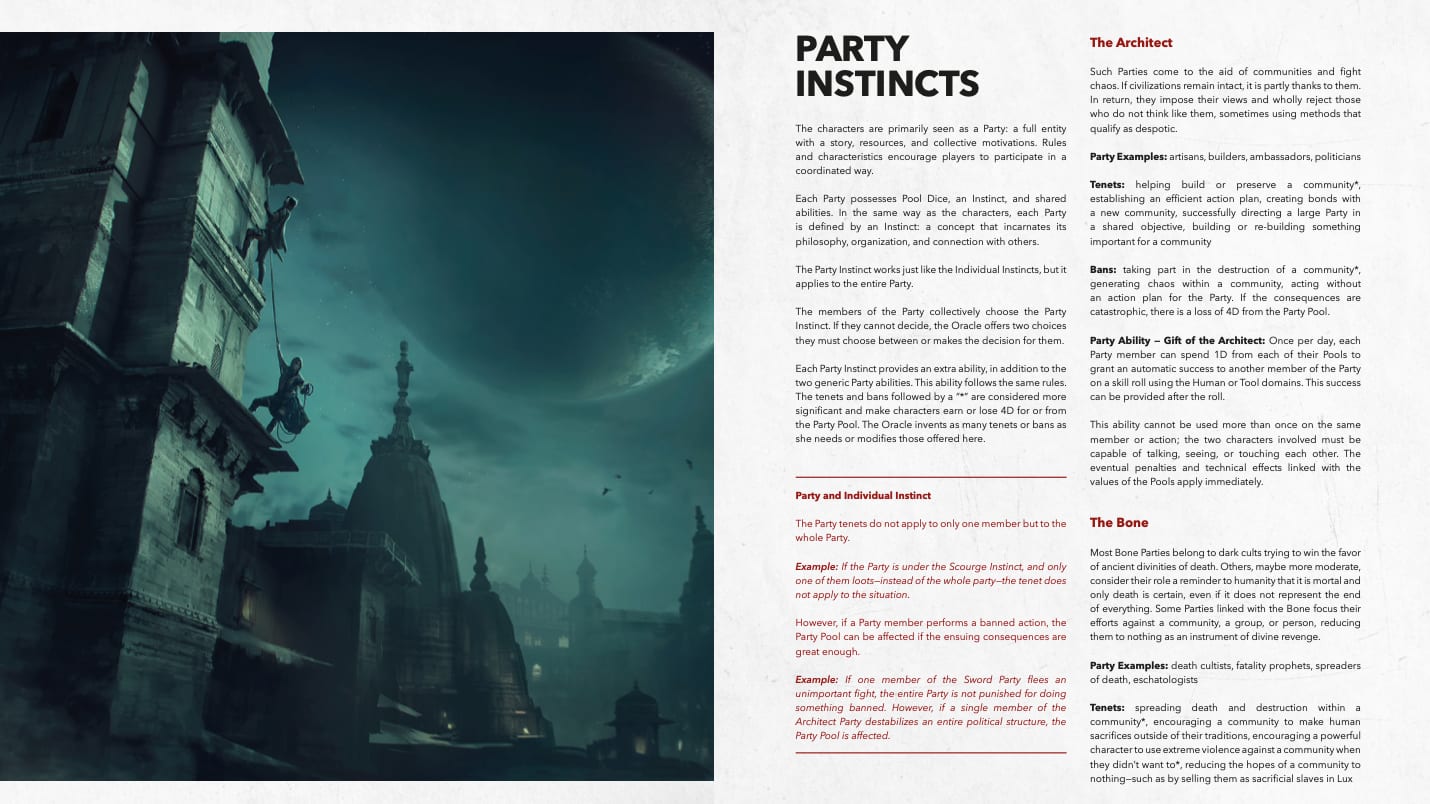
There are descriptions and associated rules of Gods in GODS (heh, heh) such as: what kind of favors can be granted, what kind of rituals can be accessed etc. but again the game encourages the GM and players to make up their own god from scratch, or modify the displayed information into a more specific aspect of the god. This of course gives a lot of freedom back to the player but also might prove to be a bit time-consuming.
Supplements
For the final stretch of our journey into GODS, I’ll have some words regarding two supplementary book(lets), Book of the Oracle and Adventures in the Wildlands, before expressing some final thoughts on the game.
Book of the Oracle
This is a GM-facing book but not necessarily a “GM’s Guide”. In fact, GODS offers little explicit advice to GMs overall as to how to run the game; but given the likely audience for GODS this can be excused.
Book of the Oracle still is absolutely essential for the GM to read. As suspected, there are answers to be found here on many little secrets hinted at in the setting descriptions in the core book. More importantly however, the book includes additional, key setting information that is entirely withheld from the core book as it is supposed to be discovered during play. Further, additional rules for a form of “end game state” to the GODS campaign are explained, and it is quite a turn of events. I’ll not go into more detail here as not to spoil the surprise, but yes, it does get pretty wild.
The books starts with 15 pages of history and offers some more clarity on what exactly happened in the Wildlands before and – especially – after the Gods’ exodus.
The following, somewhat larger part of the book is dedicated to the Cult of the Black Sun, the default enemy faction of GODS. And this is a good idea: Unlike other “fantasy” games, GODS seems to offer little variety in potential enemies at first, and whacking yet another black-robed cultist might become boring after a while. Using the information in this book, the cult receives a more complex structure and it becomes easier for the GM to envision different opponents with very different approaches on how to hinder The Chosen in their quest to serve their ancient gods. The GM also learns about the cult’s inception, and additional pages spent on explaining the cult’s inner workings help to make its goal clearer and the motivation of its members understandable.
Some short descriptions of powerful groups and individuals active in the Wildlands follow, but don’t offer much more insight than to give basic plot hooks or ideas. The book then expands a bit on the small bestiary of the core book before offering three scenarios to play. The format of these scenarios is very similar to the one in Lex Arcana – you get a plot synopsis, followed by a description of individual scenes spread over a three-act structure that may or may not occur, and some stat blocks for NPCs you may require. As each of the adventures must do with about 20 pages each, it all is pretty short and barebones (even more so than in Lex Arcana). Maps or building layouts are sadly entirely absent.
The scenarios itself are a good addition to the book as they provide a glimpse into Gods’ supposed look and feel. The adventures go strong into a narrative, puzzle-solving, mystery-discovering direction with the occasional combat encounter thrown in for some action. It feels fitting to the game’s overall theme.
All three scenarios in Book of the Oracle are set in the culture of Babel, the center of the Wildlands, and can likely be played in order, even though they have no deeper connection with each other. The following paragraphs contain a short description of these adventures and include small spoilers.
In Naruun’s Legacy, the Chosen travel to an oasis in the Desert to investigate the recently discovered, ruined estate of a sage that has died three centuries ago. They must try to keep the locals from plundering the villa and gain access to the knowledge hidden within before agents of the Cult can take it for their own.
In The Azure Tear, which might be my favourite one, the Chosen come into possession of a powerful artifact by chance and must uncover its secrets. However, a mysterious group called the Weavers want the artifact for their own devices and clash with The Chosen. This scenario is the only one where the Cult of the Black Sun doesn’t come into play at all.
In Venomous Corruption, the Chosen travel to Issour in the south of Babel and discover the sinister plans and perversions of the town’s ruling elite. A few dead servants at an orgy is just the beginning of the horror that unfolds here, and The Chosen might learn here they are not the only ones contacted by the Ancient Gods.
All three scenarios are interesting enough but in my opinion suffer from too little detail, and putting a lot of the work on the GM. A very good idea however is the two-pager added at the end of each scenario that outlines the most vital information and all scenes for the GM in a bullet point fashion that can be easily referenced during play.
Adventures in the Wildlands
Here four more adventures can be found. They follow the structure and 20-page-each scope of the three adventures in Book of the Oracle, and both good and bad impressions apply here as well. However, these adventures do expand the scenery throughout the Wildlands beyond Babel.
The Chain Breakers is set in Tuuhle, where The Chosen are contracted by local authorities to deal a blow to the slave trade of the Empire and may find an unlikely ally within the Empire’s legion.
Keep Me From My Friends, the best of this bunch in my opinion, starts out in Thalos as a Republican Senator’s protegè (and lover) has gotten himself captured in the lands of The Horde. The Chosen are sent to negotiate his release, but this task proves to be everything but a straightforward one.
Fort Silenius is a bit of a weird trip set in Babel. At first, there is “just” some missing merchant vessels bound for Avhorae to be investigated, but it soon turns out that this is not the work of common pirates. The adventure ends in a mysterious woodland fort ruled by an entity with powers far beyond The Chosen’s capabilities.
The Call, set in the Divided Kingdoms, puts the Chosen on the trail of a remarkable Vaelkyr Raider that turns out to be of interesting lineage. To further complicate matters, an artifact that may or may not be a Shard starts calling out to the man… .
In my opinion this adventure booklet is a good addition to GODS but not as essential as Book of the Oracle. Across all seven adventures that I looked into, I liked the diversity of themes and stories as it shows quite some narrative quality that can be obtained through the stronger parts of the setting.
Wrapping It Up
Which now brings me to the conclusion, and the question: Should YOU invest time and money into GODS?
To which I would reply: Only if (a) you are fine with a very mature themed setting, (b) you are willing to do substantial work of your own as a GM to develop a campaign or make good use of the scenarios and (c) you are happy with the quirks of a system that relies heavily on player-controlled resources and dice pool management.
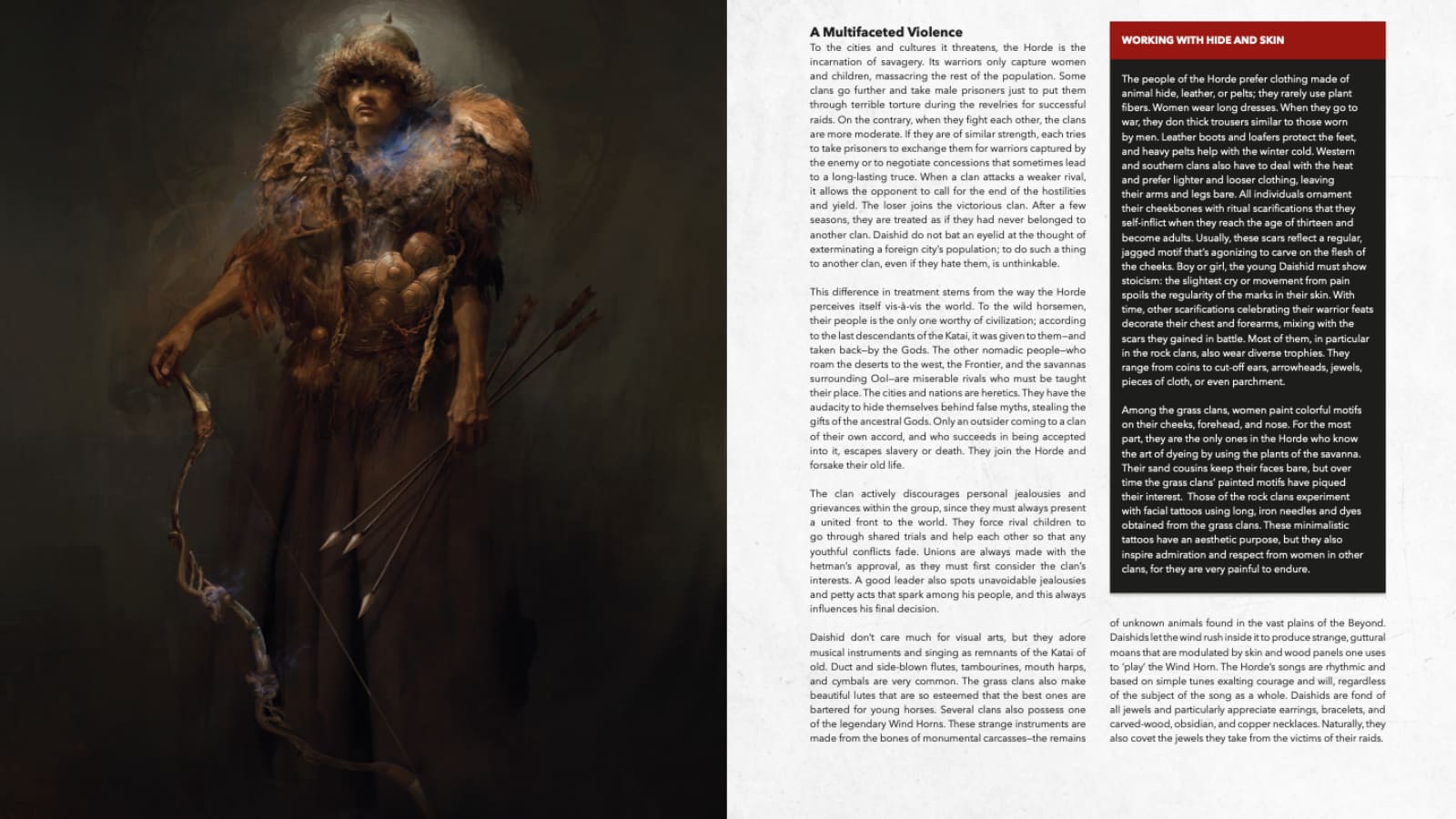
If the answer to all three is Yes, GODS offers a fascinating world to dive into and the opportunity to play a game on the somewhat lesser-trodden path in the realm of fantasy RPGs.
My main criticism, shaped mostly through personal taste of course, would be: Compared to other setting-driven heavyweights I’ve read and like, GODS feels somewhat “lighter”. In all fairness, many of these games had more time to develop their setting across more publications, but if I compare the thirteen cultures from GODS with the thirteen cults from Degenesis – just using the core rulebooks as a reference – there is a clear difference in the quality of description and “sense of wonder” this description evokes. Given enough time and publications, I like to think that GODS would have the potential to become truly interesting, and not just the proof of an interesting concept.
A lesser point of criticism, and actually more of a trait than an actual detriment, is that I don’t see this game working well with less than four players at the table, given the strong influence of party mechanics over the game system. Running it for two players or in a one-on-one setting would require more work here than for most RPGs.
I’d still be very much open to try this out some day. The building blocks to create an epic, memorable experience are there, it just requires a very good stonemason (and a couple of open-minded players, too).
Ω
